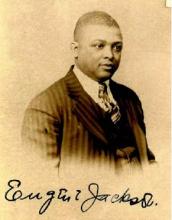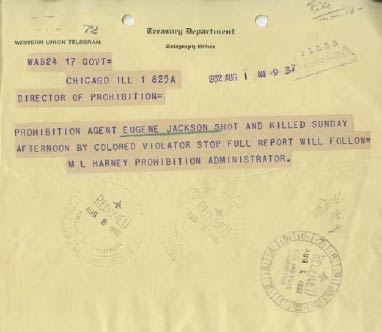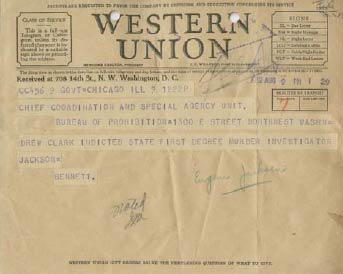
Remembering Prohibition Agent Killed in the Line of Duty
Editor's Note: This story was created using excerpts from official investigative reports. Eugene Jackson is the first known African-American prohibition agent killed in the line of duty.
Undoubtedly, life was good for Prohibition Agent Eugene Jackson and his new bride of one month, Lillie. It was July 31, 1932, and the Washington Senators were playing the Chicago White Sox at Comiskey Park. The Senators were ahead by three runs. The Jacksons and their good friend, Narcotics Inspector James Fletcher, dressed in their Sunday finest, were passing the day together waiting to pick up Fletcher's wife at the railroad station.
Jackson had been working as a federal prohibition agent in a temporary status since September 1925. In March 1932, after passing the written exam, he was granted permanent status and with it came a transfer from Washington to Chicago, his first choice for duty office. Not only did he have a job making $2,300 annually in a time when work could be hard to come by, he landed in the hot spot of prohibition enforcement.
As if things couldn't get any better, Fletcher had also recently been granted a transfer from the capital to the Windy City, moving before his wife so that he could settle in and prepare for her arrival. He rented a kitchenette apartment in the same building on South Parkway as the Jacksons. Fletcher's wife was scheduled to arrive on a train that same afternoon, and the three friends were happily anticipating her arrival as well as their exciting new future. All in all, life was good.
Shortly after lunch, the three went to the railroad station. When they arrived, Fletcher's wife was not there as expected. They returned home, no doubt disappointed by the mix-up.
Jackson parked his automobile on the street directly in front of his residence. No sooner were the tires on the curb when they saw a man, about 30 years old, walk up to the house two doors down and knock. From inside the car, the three friends watched him deliver a package wrapped in a paper bag much the way liquor was frequently packaged for delivery to the neighborhoods.
"Ten to one he's a bootlegger," said Jackson.
"You got that right," said Fletcher.
"Now boys, it's Sunday," said Jackson's wife.
"I'm gonna go talk to him," Jackson said. "See if I can make a buy."
"Please let it go," Jackson's wife pleaded. "Make your case some other time. It's Sunday!"
"It's my duty, day or night, to make a case against bootleggers. I've got to go."
Before Jackson's wife could protest further, Jackson was out of the automobile and at the man's side.
"Can you get some liquor for me?" If the man was surprised, he didn't show it.
"What makes you think I'm a bootlegger?"
"I just saw you deliver a package. Anybody can tell it was liquor."
"You a prohibition agent?"
"I'm just a colored man from out of town."
"There's colored agents too. Whereabouts you from?"
"Washington D.C. There's my car with the D.C. plates," Jackson gestured at the automobile.
"How much does the colored man from D.C. want?"
"A gallon will do."
"Be back here in a half hour. If I find you're a prohibition agent, though, I'll come back shooting."

Western Union Telegram announcing the death of Prohibition
Agent Eugene Jackson. Courtesy of ATF Historic Archives
By the time Jackson got back to the car, Fletcher had removed his duty revolver from a bag and placed it on the seat next to him. Jackson opened the car door for his wife and offered her his arm. He escorted her out of the car and up the two flights of stairs to their apartment, leaving Fletcher behind in the car.
No sooner had Jackson opened the apartment door than his wife tried to dissuade him from making the arrest.
"I heard what he said, Eugene. I don't like all of that gun talk. I'm frightened."
Eugene did his best to reassure her before he picked up the phone and called his regular partner, Prohibition Investigator Moses Proffitt. When Proffitt didn't answer the phone, he called Prohibition Investigator Smith Wilson, another colleague.
When Jackson asked Wilson for backup, Smith didn't hesitate. "He'll be back in 30 minutes - I'll be there in 20."
"Outside, unbeknownst to Jackson, the bootlegger, Drew Clark, returned early and pulled alongside of Jackson's car. He held up the jug of liquor for Fletcher to see. "Got it. Where's your friend?"
"Upstairs getting money."
"I can't be hanging around here."
Fletcher, trying his best to help his friend make the case, replied: "He's coming. Just hold your horses."
Clark got out of his car and waited next to Fletcher, who remained seated in the passenger seat. But not another word passed between them.
Satisfied that Wilson was on his way, Eugene hung up the phone and headed for the door.
"At least take your gun," Lillie said."
"Too bulky. He might see it."
"Please, Eugene."
Fletcher got his gun. "One gun's enough. I don't need any gunplay today," said Jackson, perhaps remembering his involvement in the shooting death of a D.C. gambler in February of that same year and the sticky internal investigation that followed.
And with that he went out the door, leaving his anxious wife behind in the apartment, looking out of the front window onto the street below.
Eugene greeted the landlady on the landing as he passed and briskly strode up to Clark. "You got the liquor?"
Yup, I do. You got the money?"
"How much for the whole jug?" Jackson reached in his pocket and pulled out the bills to pay him.

Western Union Telegram announcing the indictment of
Drew Clark. Courtesy of ATF Historic Archives
As quick as Clark snatched the money and handed Jackson the jug, Jackson pulled out his badge. "Federal prohibition agent, he announced. You're under arrest."
Clark plucked his revolver out of his pocket and fired two quick shots into Jackson's torso. Jackson fell against Clark's car. The jug shattered, spilling liquor onto the sidewalk. Jackson landed on the running board of the bootlegger's automobile, and lay still.
Fletcher burst out of the the car. Clark quickly fired four shots at Fletcher, who fell to the ground behind the automobile and crawled into the road.
Possibly out of bullets, Clark took off running down the street. Fletcher rebounded and quickly jumped into Jackson's automobile to give pursuit.
Fletcher lost sight of Clark around 39th St. and drove back to the scene of the shooting. Only then did he realize how badly injured his friend was. He struggled to load him into the car, and sped off to Provident Hospital at 16 West 36th St.
Meanwhile, Prohibition Agent Smith Wilson arrived according to plan and right on time. But all he saw was Jackson's car with Fletcher behind the wheel speeding down South Parkway. He did what he was trained to do. He cordoned off the crime scene and picked up the pieces of the shattered jug, attempting to mop up the evidence dripping into the gutter. He recovered two ounces of the liquor and prepared it for shipment to the United States Chemist for analysis.
A few minutes after arriving at Provident Hospital, Eugene Jackson passed away despite the heroic efforts of the hospital staff. His last words were reportedly, "God have mercy on my soul." A little over one week after Prohibition Agent Eugene Jackson was killed in the line of duty, bootlegger Drew Clark was indicted on first degree murder charges.


